E-Pluribus | April 20, 2022
Democracy and protecting the individual, books bans and cancel culture, and inter-elite competition in the internet age.
A round up of the latest and best writing and musings on the rise of illiberalism in the public discourse:
Yascha Mounk: How Diverse Democracies Can Protect Their Citizens
Yascha Mounk has a new book out this month called The Great Experiment: Why Diverse Democracies Fall Apart and How They Can Endure. Mounk has written an essay for The Atlantic adapted from the book about the duty of diverse democracies to their citizens and how they can best preserve individual freedom.
On what basis can diverse democracies protect their citizens from coercion—both by the state and by members of their own groups?
[ . . . ]
Liberals can do better than communitarians and other rival philosophical traditions at reconciling the desire of many citizens to be true to their identity with their need to be free from the cage of norms. In the liberal view, diverse democracies are constituted by a broad variety of individuals, not a set of groups. They should be committed to protecting the core freedoms of these individuals. A just democracy has a legitimate reason, and even an obligation, to step in when ethnic or religious groups attempt to coerce their own members.
Critics claim that this emphasis on individuals makes classical liberals incapable of appreciating the importance that groups play in the lives of so many people. But liberals have deep respect for the importance of family, religion, and tradition in contemporary societies. They are fully aware that many citizens lead their lives in accordance with norms they consider dictates of conscience. In fact, this is precisely why liberals are so concerned with protecting the kinds of guarantees of personal liberty, such as freedom of speech and worship, that ensure that citizens won’t be forced to abdicate their innermost beliefs.
[…]
But for liberals, this deep respect for cultural or religious communities ultimately derives from the commitments of their members. If liberals respect Baptist churches or the Muslim faith or the Humanist Union, they do so not because they regard these groups as the founding units of our society, but because these groups hold tremendous significance to millions of people.
Read it all.
John McWhorter: The Right Likes Book Bans. That Fuels the Left’s Cancel Culture.
In his latest for The New York Times, John McWhorter takes both the left and right to task for their illiberal tendencies and explains how each side can seem blind to their own impulses that are so obvious to them in their opponents. While there is much to be said for confidence in deeply-held principles and beliefs, there are also dangers that come with an overdeveloped sense of one’s own moral superiority.
Which is what the book-banning right must urgently come to grips with, because its increasingly illiberal streak parallels the excesses of the hard left’s engaging in hyper-woke partisanship in the guise of progress and social justice.
And the left is definitely no model: Last week, the book “Bad and Boujee: Toward a Trap Feminist Theology,” written by a white academic, Jennifer Buck, was canceled — pulled from circulation by its publisher. As Alter and Harris reported for The Times, the book’s blurb says it “engages with the overlap of Black experience, hip-hop music, ethics and feminism” but it was “widely condemned on social media as poorly executed and as an example of cultural appropriation.” The question is why the book, whatever its flaws and whatever criticisms it faces, should be utterly disallowed from further distribution. Perhaps the author sounds some notes that reveal her as an outsider to the culture she describes; perhaps the book just isn’t very good — but whence this idea that it should be zapped out of existence?
These cancellations are part of a larger project, seeking to muzzle opinions antithetical to the woke quest to eternally contest power differentials and endlessly expand the definition of white supremacy. People on the right are duly appalled by this mind-set. But they miss that their book bans are just as tinny, just as local to petty concerns of our moment and just as, well, unjust. And by revving up its own cancel culture, the anti-woke right is providing the woke left with bulletin-board material: The left, when called on its excesses, can just point to the right’s school-board crusades to justify its own inquisitional zeal. Don’t ban “Bad and Boujee”? How about: Don’t ban “The Bluest Eye”! I’ve encountered endless renditions of this argument in the wake of my book, “Woke Racism.”
The conflict-shy left-of-center onlooker, alarmed by — but unprepared to confront — wokeism on his or her own “side,” winds up finding a certain comfort in what the right is doing. If right-wing zealots are as out-of-bounds as left-wing zealots, they’re able to classify hyper-wokeism as but one symptom of a pox on both ideological houses — a larger, equal-opportunity puritanism. This, in seeming rather hopelessly general, and a matter of a national mood rather than a particular fault of a woke agenda, evinces less desire to face it down. It seems too protean to productively oppose, and all you can do is shake your head and move on.
Read it all here.
Daniel M. Rothschild: Inter-Elite Competition and Institutional Destruction
Americans love a good spectator sport and this passion is by no means limited to athletics. The advent of the internet — and social media more specifically — has opened up a 24/365 venue where ordinary citizens can observe and root for their favorite elites as they take on their fellow A-listers. At Discourse Magazine, Daniel Rothschild examines this phenomenon and the harm that it can generate to the institutions that host these political, social and cultural contests.
Before the internet, national elites were cloistered in three or four East Coast cities plus Los Angeles (joined by a few industry-specific cities, such as Nashville for country music elites and Houston for the titans of the petrochemical industry). They had similar credentials, worked in a more or less fixed number of industries with an inelastic number of firms, and shared a commitment to institutional continuity and maintaining their stature against outsiders. Political elites were all in or around Washington, literary elites were all in or around New York, academic elites were all in or around (or in temporary exile from, yearning to return to) Boston, mass culture elites were all in or around Hollywood and media elites were scattered throughout these cities.
[ . . . ]
Today, elites can exist in industries that didn’t exist 20 years ago (podcasting, social media, internet writing) and be rooted in places that were erstwhile definitional backwaters (“equities in Dallas”). There is no expectation that they “serve their time” or otherwise go through a trial process lasting years or decades before coming into their own. They can define their market segment as widely or as narrowly as they desire, and they seldom have to please gatekeepers. And when gatekeepers still do exist, it’s easier than ever to circumvent them entirely.
[ . . . ]
In 2020, economist Mark Lutter predicted that the current decade would be “half ‘burning ’20s’ with institutions going to hell [in] a handbasket and half ‘weird ’20s’ with different forms of social organizations, communes, charter cities, religion, etc trying to fill the void.” Two years in, that prediction is being borne out, perhaps most clearly in inter-elite status competition. When elite competition was primarily intramural, elites were institutional preservationists, which meant that most people barely noticed when individual elites were replaced within the institution. Inter-elite competition means more institutional destruction (of both the creative and nihilistic sorts), which means far less social stability. As a result, almost all areas of our lives and our society are affected by this new change in status competition.
Read the whole thing.
Around Twitter
Via the Foundation for Individual Rights in Education, Dartmouth adds insult to injury after a cancelled College Republicans event:
Via Andrew Sullivan: how to teach gender theory to 10th graders without (directly) teaching gender theory to 10th graders:
Excerpts from a J. K. Rowling thread quoting a 1978 Václav Havel book in the context of modern day pressures to conform to woke narratives:
Finally, a penny for your thoughts, assistant dean at Princeton:






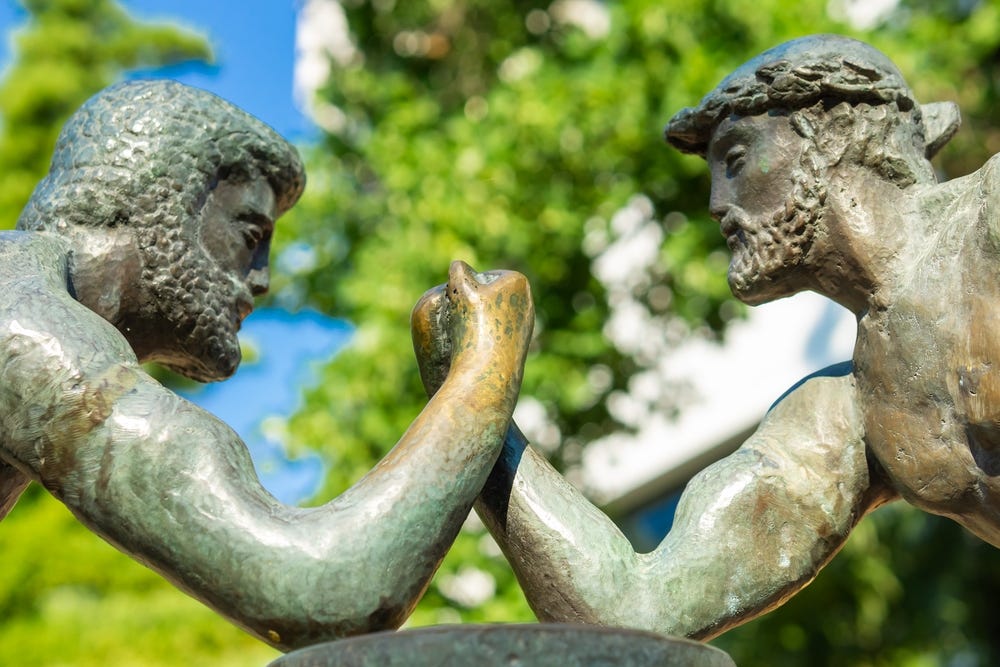




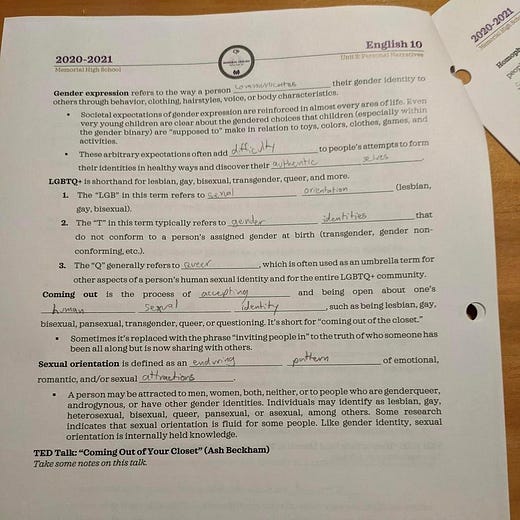
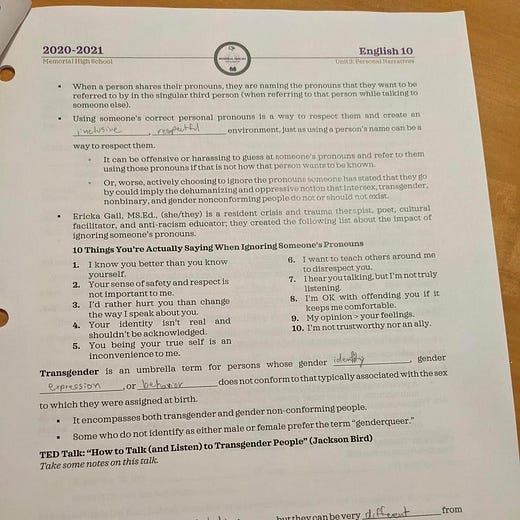
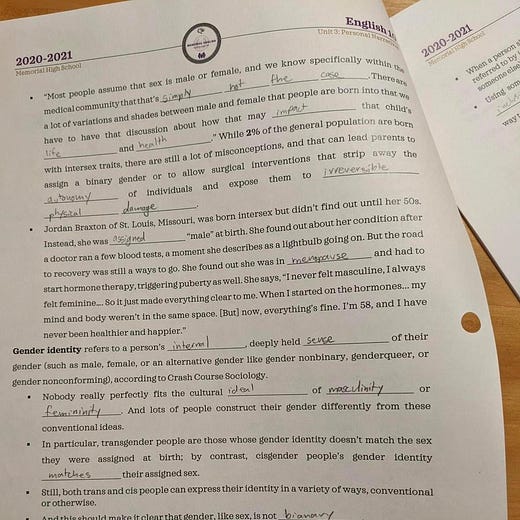
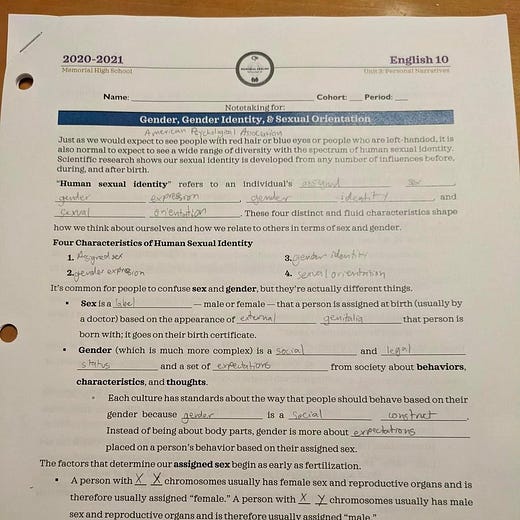

I respect John McWhorter and know he has to say "both sides do it" if it's going to be published in a place like the NYT, but people keep making this same case of cancel-culture equivalence that doesn't hold up.
One one side you have red-state legislatures like Oklahoma etc banning books, which is stupid and backwards, but at this point "Look at how dumb the rednecks are!" is a Dog Bites Man story that has a long, illustrious history stretching back to Mencken; the other side is made up of corporate media, academia, Big Tech, not to mention Hollywood and the publishing industry, which combined are the ideological enforcement arm of the Left/Team Blue.
There is no question as to who has vastly more power and reach, and there is no question as to who should know better about the downsides of censorship and ideological groupthink.